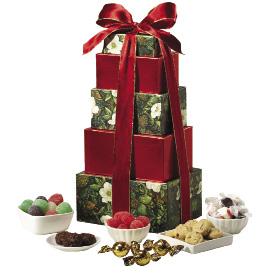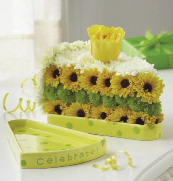- Home
- Media Kit
- Current Issue
- Past Issues
- Ad Specs-Submission
- Ad Print Settings
- Reprints (PDF)
- Photo Specifications (PDF)
- Contact Us

![]()
ONLINE

Taking Care of the Customer
Editors’ Note
Jim McCann has been active in the floral industry since 1976, which is when he began building a chain of retail flower shops in the New York metropolitan area. He acquired the 1-800-FLOWERS phone number and renamed the company in 1986, launched the company Web site in 1995, and took the company public in 1999, renaming the firm once again. He is a published author and an award-winning public speaker, as well as a member of the boards of directors of Willis Group Holdings Limited and Gruppo Lottomatica.
Prior to assuming his current role with 1-800-FLOWERS.COM, Chris McCann served as the company’s Senior Vice President. He serves on the board of directors of Bluefly, Inc. and is a member of the board of trustees of Marist College.
Company Brief
Beginning as a retail flower shop in 1976, Carle Place, New York-based 1-800-FLOWERS.COM is now one of the most recognized brands in gift retailing, providing flowers, plants, gourmet foods, candies, and gift baskets to customers around the world via the Internet (www.1800flowers.com), telephone sales, and an international network of company-operated, franchised, and partner stores. The company maintains strategic online relationships with AOL Time Warner, Yahoo!, and Microsoft Corporation, among others.
Can you give us a brief overview of how the business has evolved and where you see it today?
Jim: We started 33 years ago with a single flower shop, and our concept was to build the best flower and gift shop we could to serve our customers’ need to express themselves and connect to the important people in their lives. So we offer all the things you’d expect to find in your best high-end flower shop anywhere in the U.S. including plush products, greetings product, lifestyle giftware and products, confectionary products like chocolates and novelty candies, homemade food gifts like our pretzels and popcorn products, and our gift baskets.
We finished our fiscal year in June, and it was the first of our 33 years that we had a backward year. Our year-end forecast is that we expect to be down 5 to 10 percent in sales.
While we entered last fiscal year with a dozen projects we were investing in, we pared that back to four: 1-800-BASKETS, which we see as the other pillar of our emerging business; technology, including our mobile efforts because we think mobile will be the fourth wave for us in our life experience; Celebrations.com, which is more of a lifestyle destination for people who are looking to get inspired in creating all the different celebratory events in our lives; and 1-800-FLOWERS BloomNet, which is our association of retail florists around the world who are partners that we use to fulfill our orders and work with our customers. These guys are having trouble in this economy, so we’re joined at the hip with them to make sure they realize that our success is dependent on their success, and that there are more things we can invest in that will be beneficial to their future. We have scale, so we can provide things like software to our BloomNet florists as a service. We have also had to make an investment in our talent this year in the form of severance payments. This is the first year since I’ve been in business that we’ve had to lay people off, and it was painful.
While we just got kicked in the teeth, the good news is, we don’t have stores all over the place, because if we were a store-based retailer with all those leases, we would not be able to cut our expenses. We’re more of a virtual model, so we can pare our expenses back to be as profitable as we were when we were smaller. We have new technologies and systems. For example, we have a couple of thousand people in our service organization who service our online and telephone customers. Two years ago, we had five service centers; we closed three of them, but since we jettisoned the expense of those three fixed facilities, we didn’t have to lay our service employees off. We offered them all the opportunity to continue to work with us from home, because the technology that Chris had us invest in gives us the ability to do that. This lowered our costs, improved the lifestyle of our service people, and improved the quality of our customer service because our people stay with us longer, and are happier because they have more flexibility in their lives. So that investment in technology created the platform for us to create a win-win situation.
Chris: The inherent purpose in these strategic initiatives is taking care of our customer, and that requires that we know who the customer is and how this market is changing. Part of our investment is in connecting with our customer so we can understand who they are and then making sure that all of our senior management is interacting with our customers on a regular basis, so we continue to have a good feel for what’s happening. We can then adjust our businesses appropriately, whether it’s establishing the right value/price point for people who want to connect and express themselves today and making sure that we’re delivering against that price point, or looking across our portfolio of product lines and making sure we’re bringing the right combination of gifts, which was why we decided to start 1-800-BASKETS. We’re fortunate that we can shift some attention to a product like a gift basket that includes food, which our customers recognize as having a higher degree of value.

Grande Arbor Tower
What are you hoping to bring to your retail partners with 1-800-BASKETS?
Chris: With 1-800-FLOWERS, there is a tremendous amount of brand equity and value built into that brand, so when you come to the Web site of 1-800-FLOWERS, which gets more traffic than any other food gift company in the space today, you’ll be given a choice of shopping at 1-800-FLOWERS or 1-800-BASKETS. In recognizing our leadership responsibility in the flower category, we realized that we have an opportunity to gather our hands around a fragmented $16 billion market that exists in the food gift space, and bring that business to the retail sector to leverage the skill set they already have today. Retail florists are used to taking products from all around the world, like flowers, assembling them, and often combining them with balloons or with other products, so we’re taking that confecting and design skill they already have and applying that to the food gift space and gift baskets. The business was launched in September and has given our 10,000 retail florists partners around the world the opportunity to step into this other industry.
How will it impact the end consumer?
Jim: Over the past two years, for each of our brands, Chris has initiated a deep dive in terms of research and focus groups to understand our core customer. So at 1-800-FLOWERS, we know she’s oftentimes buying other gifts elsewhere that may be appropriate for us to carry. So why should we not give her gifting alternatives, because when she’s feeling stressed, financially or otherwise, the need to connect is all the more important. We have a real focus on value by making sure we have the right price points for people today, because they still want to send, to connect, and to engage with important people in their lives, but they may not be able to afford the same items they used to order. We still look for ways to service them, and although maybe we’re not going to make the same margin, we still need to make sure we have the right gift set. We can create more options with 1-800-BASKETS because we can confect all different kinds of things. For us to sell you a commodity item like an iPod, we can’t do anything better than Best Buy does in that scenario. But if we put it together with a couple of other thoughtful gifts that Best Buy is not in a position to offer, but that our florists at 1-800-FLOWERS BloomNet can, and add the leverage of our same-day delivery capability, then the skills of our 10,000 retailers and their staffs and their local knowledge can help our customers express themselves and connect with the gifts they already want. This is a $16 billion category and we only have $30 or $40 million of that right now – we want a larger share.

Godiva Decadence Basket
What operational changes have you had to make to cope with this down period?
Chris: We have to understand the amount that a customer is willing to spend so we can evaluate our price points. This may mean we have to work on less margin than we’re normally used to and we have to make sure our cost structure is in line behind it. In the past year and a half, we’ve taken $75 million in costs out of our operating expenses, but we will need to take more out, and that means finding different ways of doing business. If you look at the example of the service center platform, one move is shifting it from a fixed space to a virtual space, and we’ve been doing that and will continue to do that; the other is finding out how to increase the service level while reducing the cost structure. Where all of our regions used to universally handle all of our different brands, now we have them focusing on two. So the flowers and baskets customers will be served by the same base of agents, which allows them to know their product lines and brands much more intimately.
How broad is the customer base for you, with regard to value and price point?
Chris: We launched a celebrity designer collection seven years ago, and that was more of a marketing strategy than anything else, to let people know we had an aspirational product line. One of the things we learned is, no matter who you think your customer is, 10 percent of your customers don’t care about price. We recognize that, but at the same time, we have to make sure our brand and price points are positioned for our core customer.
Jim: For example, we started contracting with our partner growers around the world to grow ever larger amounts of product to fill the demand for our less expensive roses for Valentine’s Day. We have roses from $19.95 a dozen to $1,000 a dozen when other things are added in, like a five-pound box of chocolates from our Fannie Mae collection, our beautiful Waterford vase that the roses comes in, and a bottle of champagne from the Napa Valley. Those $1,000-a-dozen roses are for those customers who want to make a colossal statement with six-foot roses in a beautiful vase with the other fine gifts with it. We did it primarily as a tongue-in-cheek kind of thing, but we sold a half dozen of those the first week we announced it. So there is a customer for everything, but we understand who our core customer is and have the right value price point.
How do you put the metrics in place to really evaluate that customer experience?
Chris: We’ve been very good at managing by core metrics, especially operational metrics, and that’s evident in the way we’ve been able to reduce our operating expenses. As our focus shifts more toward the customer experience and understanding who they are and what they want, we need other metrics besides the normal ones that we have in place such as retention, frequency, acquisition, and class.
Jim: On the quality side, for our U.S. domestic florists and our 1-800-FLOWERS BloomNet network, we’re the only company out there that really measures the quality of service of our florists, and the only one who will boot them out for poor performance. We have about 50 people who do nothing but quality programs with our 1-800-FLOWERS florists, so they’re doing everything from playing secret shopper to handling training programs. We recently sent a whole program about the latest science on care and handling of flowers to our BloomNet florists outlining the best way to treat each kind of flower. We invest in all of those education programs because we’re nuts about quality and we’re the guarantor to the customer; but it’s the florist that provides the product to the customer.
As a very close-knit culture, how challenging has this time been?
Jim: Being an intimate company made this year all the more challenging. But you have to pick yourself up and, as entrepreneurs, do what entrepreneurs do, which is to recover more quickly than those who aren’t. The idea that this whole thing could have crumbled back in the fall is very real to all of us, and that’s going to affect our decisions going forward, such as how much debt we’re willing to take on. In a family business, that question is all the more onerous, because it’s not just other people’s money you’re dealing with. As a result of all of this turmoil, I do think 1-800-BASKETS is going to become a very big company for us, and will rival 1-800-FLOWERS in size in the years to come. Our food gift businesses have held up very well in this environment. Because it’s doing so well, we’re making franchising available for the first time ever with Fannie Mae, our chocolate company. We’re doing some supply-side things in the flower business that will improve the value of the equation even more for our customers and create even more opportunities for our 1-800-FLOWERS BloomNet florists. We have options, and we still have growth opportunities in front of us.

Slice of Life
Do you try to keep that entrepreneurial spirit alive within the company, and as the company grows, is it harder to be entrepreneurial?
Jim: It is. Chris had to kick me in the head a few times to get me to concede that we’re not that good at birthing businesses anymore, because it’s too hard to do in this environment. So we’ll grow a few ways: organically; through the birth of some businesses, like 1-800-BASKETS; and through the acquisition of some businesses.
Chris: It’s our responsibility to work with people, whether it be people who have been with the company or other new talent that we brought in, often from bigger companies, on how to flourish in an entrepreneurial environment, and that takes some time.
When you go through challenging times, it must be comforting for you two to have the relationship you do. How important has that been?
Jim: For me, it’s huge, because one of the biggest challenges of leadership in a substantial sized company is loneliness. That’s extremely comforting, because loneliness is a retardant to good leadership, and it’s nice to have that extra escape valve where your brother can slap you in the back of the head on the way out and say, “Lighten up.”